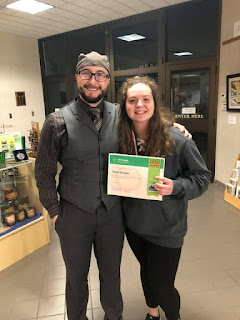In March 2019, I hosted a regional
History Day competition and award ceremony. The competition and the celebration
that followed were part of my incorporation of the History Day program into my 8th grade U.S. History curriculum. All of my 8th grade U.S. History students had to complete a project which began in August and ended in March. We started with student identity reflection and skills assessment, and then finished with a project that was meant to show students’ social studies abilities and the other skills they sought to learn.
For a bit of context, when completing History Day projects,
students can choose to present their historical work within the media of a
documentary, exhibit, paper, performance, or website. These different types of
projects give students the chance to explore a variety of sources. More details
can be found at the National History Day website.
The competition and award ceremony gave me a chance to
behold the power of my students; from the morning of the competition to the
award ceremony the next day, I cannot recall how many times I laughed, smiled,
cried, and stood in disbelief at the strength, growth, and knowledge of my
students. Due to my emotional experience, I thought I would reflect on what I
felt.
In the end, three of my students even qualified for the national competition in College Park, Maryland: Emma
Reitzel, Kate Mullett, and Dani Devaney.
The students worked harder and were more determined to turn
in good work. The project has a minimum that students must reach, but at a
certain point the students do not have to work. I had students who stayed after
school on several occasions, including weekends, to put more time into their
project when they had already met the class standards. Students went above and
beyond because of competition, but also because they had some agency in what
they could learn. Due to my experience teaching through history projects, I
firmly believe young people are not lazy, they are merely bored in classes that
do not do anything to connect the material to their interests, especially
modern-day issues.
Parents were exuberant and respectful of the History Day
program. At the competition and celebration events, and well after, parents
expressed happiness with how their students learned, and pride in their
students’ work ethic.
Parents must be included in their child’s learning, not held
at arm’s length. Teachers have the ability, and the technology, to share with
parents what their child is learning and should do so. Parents in turn should
make an effort to help teachers with the learning. When I asked for help,
parents volunteered often and were consistently in support.
 Students wanted to learn from their mistakes and make
improvements. The same night of the awards ceremony, a student emailed me to
ask how she could make her project better (this was also the night before our spring
break). Two days later, a parent emailed me asking about the upcoming state
competition for the history projects and informed me that her student worked on
their documentary over the last two nights. I had several other emails and
stories from parents, and they go to show how much students will put in when
they believe in their work. More importantly, teachers should offer chances for
students to improve their work and this should be reflected in their grade.
Students wanted to learn from their mistakes and make
improvements. The same night of the awards ceremony, a student emailed me to
ask how she could make her project better (this was also the night before our spring
break). Two days later, a parent emailed me asking about the upcoming state
competition for the history projects and informed me that her student worked on
their documentary over the last two nights. I had several other emails and
stories from parents, and they go to show how much students will put in when
they believe in their work. More importantly, teachers should offer chances for
students to improve their work and this should be reflected in their grade. Community support must happen. Especially in the social
studies, a teacher needs the support of their community. In our information-rich
era, teachers, now more than ever, need community support. The community
members I partnered with supplied resources and experience to help my students
move forward with their topic selection and research. For example, a judge who
was familiar with theater helped direct some of my performance category
students. A museum director helped students find primary sources in the museum
archives. Support beyond research and project creation was also helpful, like
the parents who staffed our concession stand that helped fund our scholarship program.
Support is out there, but teachers need to reach out for it.
Community support must happen. Especially in the social
studies, a teacher needs the support of their community. In our information-rich
era, teachers, now more than ever, need community support. The community
members I partnered with supplied resources and experience to help my students
move forward with their topic selection and research. For example, a judge who
was familiar with theater helped direct some of my performance category
students. A museum director helped students find primary sources in the museum
archives. Support beyond research and project creation was also helpful, like
the parents who staffed our concession stand that helped fund our scholarship program.
Support is out there, but teachers need to reach out for it.



